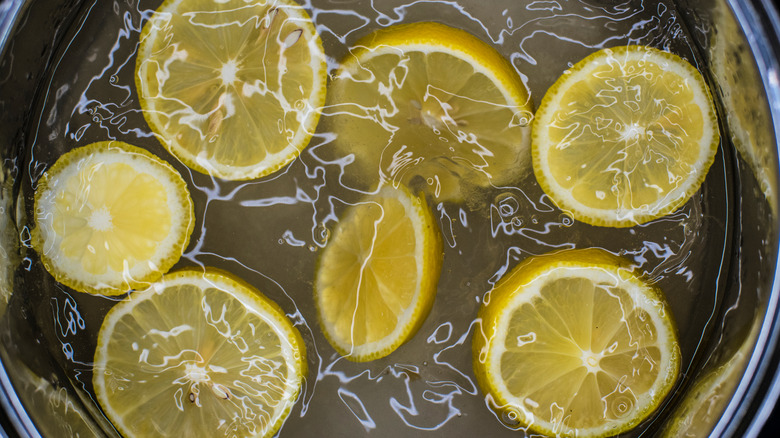The Foolproof Way To Get Rid Of The Smell Of Fried Fish In Your Kitchen
While there are countless ways to prepare fish, deep frying is one of the more popular methods. Whether it's a filet of haddock for a classic British fish and chips, panko-fried fish tacos, or a classic American Southern fried catfish recipe, perfectly fried fish is always a classic.
As it turns out, the idea of dipping filets into scorching hot oil has been around for centuries. According to the LA Times, the first record of fried fish comes from the Moorish occupation of the Iberian peninsula (modern-day Spain and Portugal) around the 13th century. This culinary tradition continued as it traveled with merchants to England and Japan among other countries. The New York Times points out that fish fries also have ties to slavery in the United States as fried fish was one of the only meals enslaved individuals were able to eat together. This tradition has since taken on its own important relevance for Black communities in the American South.
Having family over for a big fish fry on the weekend might sound like a fun plan, but you might second-guess yourself when the smell sticks around a lot longer than your dinner guests.
Why does cooked fish smell so bad
The smell of fish has become culturally recognized as undesirable. As in, "something smells fishy." It might smell great while it's cooking, but for some reason, only the unpleasant odors stick around the kitchen after the last leftovers have been packed up.
According to The New York Times, the culprit for this foul smell is a compound called trimethylamine oxide. This chemical is let off by fish while it is cooked, and produces a pungent smell similar to ammonia. This smell is typically worse in older cuts of fish. While the smell might not mean that your fish has gone bad, it does make a nice case for buying the freshest fish you can and cooking it right away.
Fulton Fish Market says that in addition to buying fresher cuts of fish, certain fish will not release as many smells. Freshwater fish in particular tend to not smell as much as saltwater fish. Catfish and other bottom feeders will also bring their own muddy odor to the table. If you're looking to outright avoid the smell, then buying the best freshwater fish available will be in your favor.
If you just can't resist frying up some haddock though, then there are steps you can take to clear the air.
How to get rid of fishy odor
There's still hope out there if your kitchen still stinks of last night's, or last week's, fried fish dinner. America's Test Kitchen says that it's easy enough to neutralize the smell left over by fried fish with a few household items. Simply take one part water to one part vinegar (nothing in particular, whatever you have in the pantry will do), put it in a saucepan, and leave it to simmer for a quarter of an hour. The acetic acid in the vinegar will then neutralize the smell of the fish still lingering in the air.
If you're particularly averse to the smell of vinegar though, you'll want to add other aromatics into the mix, per America's Test Kitchen. Feel free to add cloves, cinnamon sticks, or slices of citrus to your deodorizing mix to help cover up some of the vinegar smell, and let something a little more pleasant take its place. The smell of the vinegar should dissipate after some time either way, but adding additional smells will ease that process.


